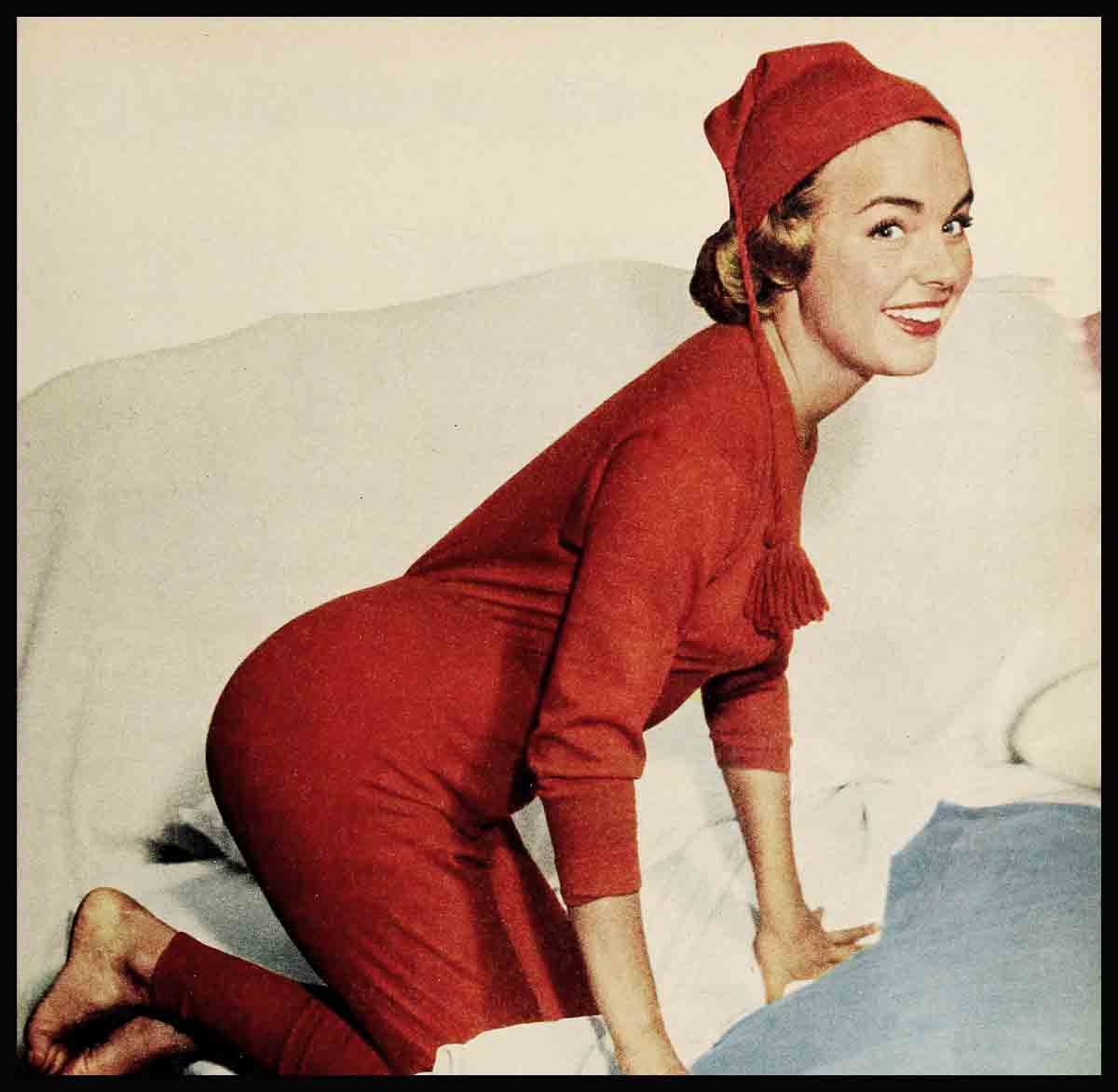
The Case Of The Smuggled Ermine Or Terry Moore And The Irates
About the middle of December, Johnny Grant, an amiable Hollywood disc jockey and banquet emcee, decided to take off a dozen pounds, no more, no less. His chances of doing so were thin, since he was about to make one of his periodic USO tours of Korea where, he says, a man can eat like a horse. Grant, no fellow to disdain the table in any climate, sighed then and bowed to the inevitable. As he had after other Korean junkets, he would return looking like a barrage balloon and quite possibly he would have to be tethered to his microphone to keep from floating out the window.
He was wrong. He did not—in a deceptive manner of speaking—even have to worry. Five days after his arrival in Seoul, he had shed twelve pounds plus three and was still dwindling. Worry had or done it.
As boss of the troupe, Grant was smack dab in the middle of the greatest fuss and fury—or so it seemed at the time—to come out of Korea since the Inchon landings. At the core of his trouble was a white ermine bathing suit, and at the core of the bathing suit a pint-size, irrepressible beauty named Terry Moore, who was about to push Vishinsky and guided missiles off the front pages for a few days. The whole episode was real George, characterized then and thereafter by almost impenetrable confusion.
MODERN SCREEN, after consideration, undertakes to put history back on the track.
The legal mind probably would break the business down in concise and orderly fashion: The Case, The Prosecution, The Defense, and The Summation. But the legal mind wouldn’t have much fun and would be courting a nervous breakdown. This way looks easier: In the drama, lasting not much more than ten days, there is a prologue and three acts. The two pertinent scenes are Los Angeles International Airport, whence the troupe took off, and Korea, where ultimately it landed. Props and personnel include:
The bathing suit.
Miss Moore.
Grant.
George Murphy, screen star and head of the Hollywood Coordinating Committee (USO Camp Shows).
General Maxwell Taylor, commandant of the Korean Theatre, and subsidiary brass.
A lieutenant (unnamed).
A sergeant (unnamed).
Mrs. L. W. Koford, Miss Moore’s mother.
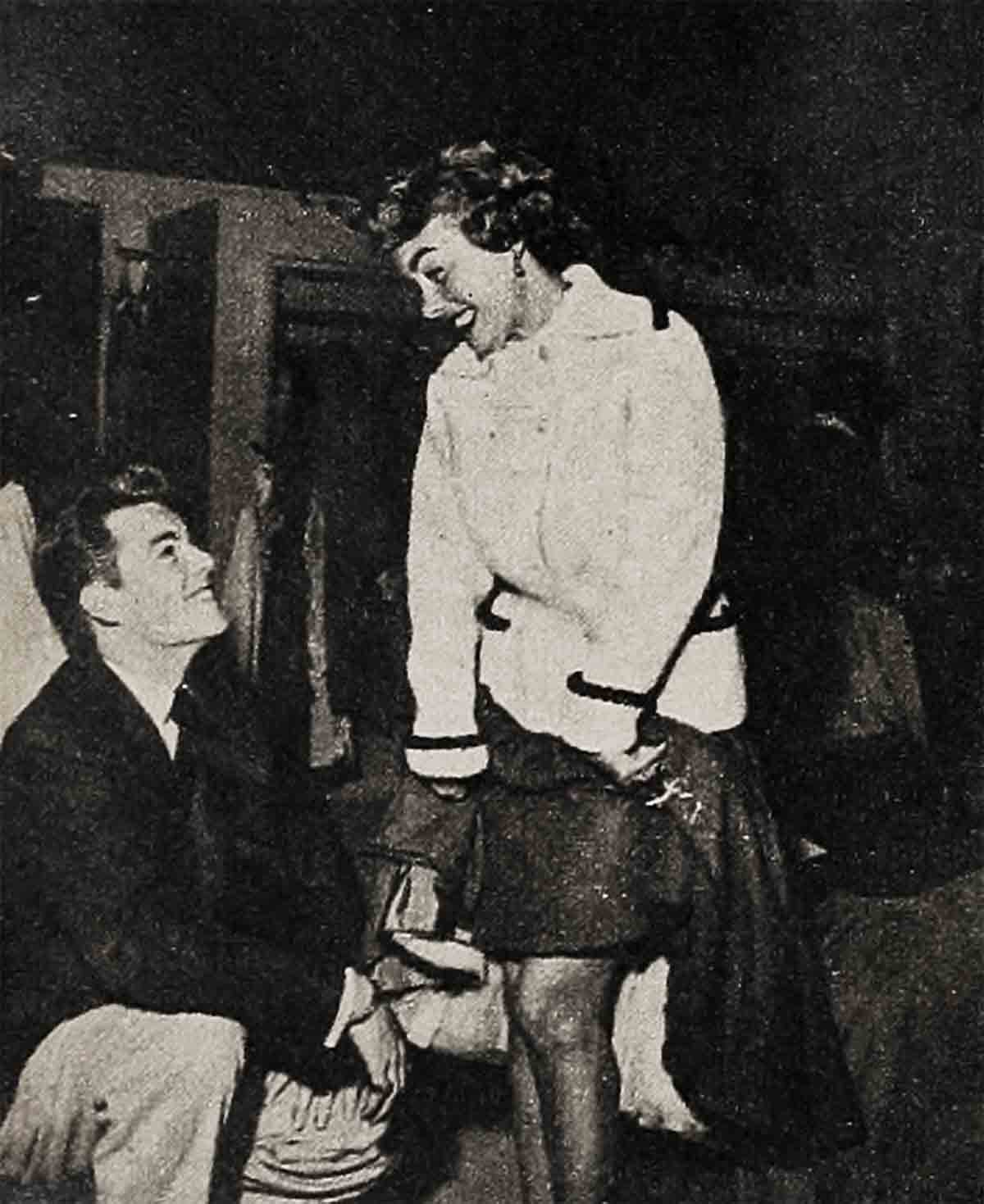
Abandoning Grant for the moment and trotting around to that which touched off the mine, the camera focuses first on a Los Angeles hotel one night last autumn. The occasion was the annual Hollywood Press Photographers Ball, the action a skit Miss Moore had agreed to do.
The skit was just a little more forthright than Korean camp shows would have permitted. And it involved The Ermine Bathing Suit. These two points, and these alone, are undisputed. In the following few days, things got pretty weird.
Newspapers reported that (1) the bathe ing suit was a Bikini, (2) Miss Moore had done a striptease, (3) she was going to do the same skit in Korea.
“Look at it,” demanded Miss Moore, a few days after her return from Korea. She had twice been ordered to leave Korea and twice held fast to have the order rescinded, while Stateside newsrooms whirred and boiled and got out the red type. She held The Ermine Bathing Suit at arm’s length, spilling mothballs like marbles. “Is that a Bikini?” It was not. It’s just a little old run-of-the-mill ermine bathing suit, and a cute one, too. “A Bikini,” expounded Miss M., “is—is nothing but a G-string for the underneath part, and—and a kind of a wispy bra. Why, I wouldn’t wear one!”
It had not been altered since?
“Certainly not! It is not now nor has it ever been a Bikini? Look, it’s even cut extra high on top so there’s no cleavage. I saw to that.”
Well, how about the striptease business?
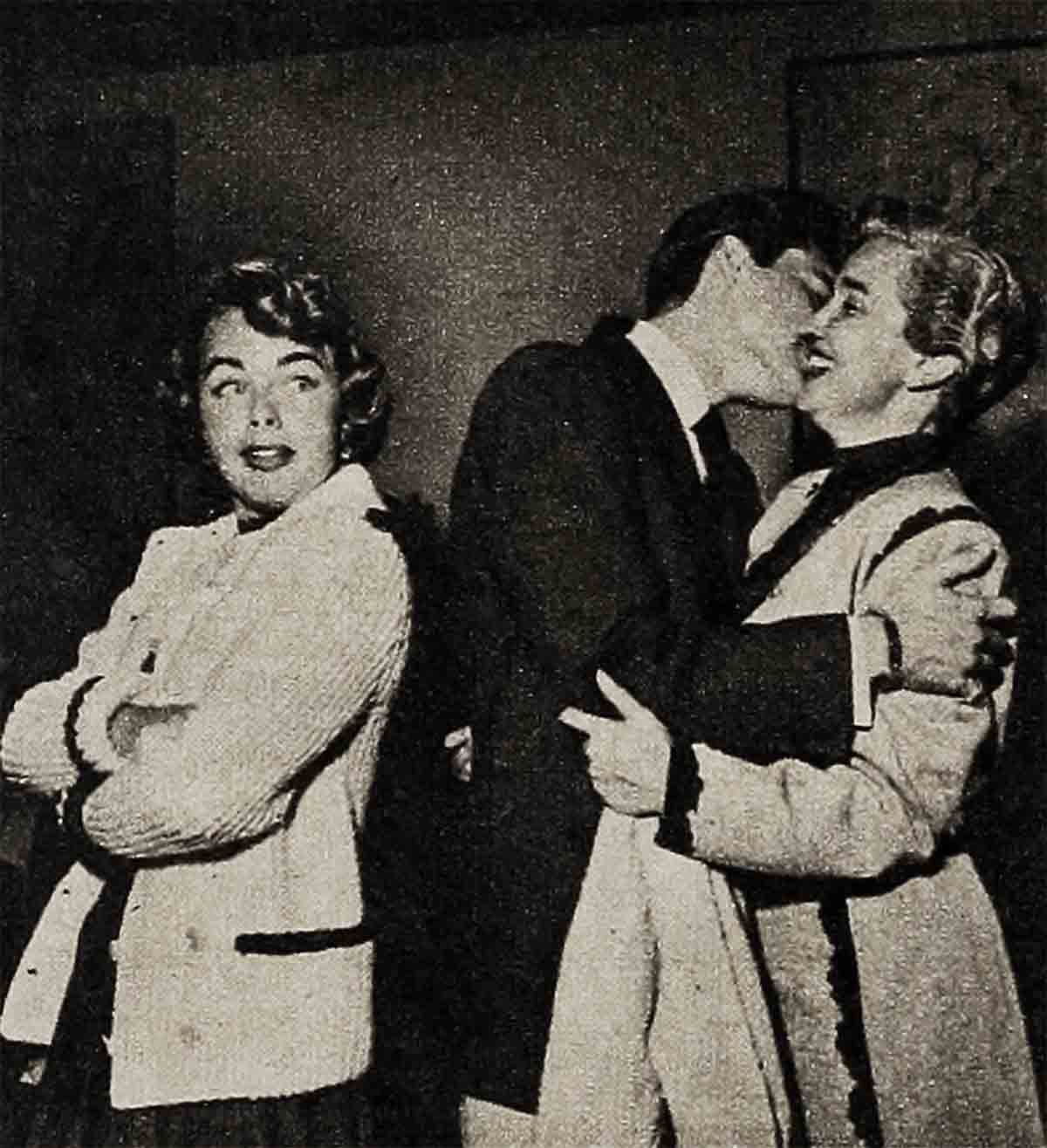
“What nonsense!” said Miss M. “For the skit at the ball, I wore a coat at first. Then I went offstage and took off the coat and came back in the bathing suit, but you don’t call that a striptease! Do you? And anyway, it was especially written material, nothing to do with what I was going to do in Korea.”
Johnny Grant confirms this categorically. “She didn’t do a thing risqué there. Sang a couple of songs and worked in a clean little skit with me. The boys loved her. She’s a good trouper. But the first part of the mix-up—I just don’t know.”
The first part of the mix-up occurred at International Airport early on the morning the troupe took off. George Murphy, speaking for the Coordinating Committee, was heard by responsible newsmen saying to Miss Moore: “If you’re going to wear that bathing suit, you might as well turn around and go home right now.”
More important, he was admittedly heard by Miss Moore to say the same words. She laughed and answered: “Oh, George, you don’t have to worry. It isn’t even packed.”
But it was.
Miss Moore, for defense summation: “Here’s the way that happened. Mother and I had talked about the suit, and then decided to leave it behind. But at the last minute, mother thought she’d pack it for—you know—some publicity shots, or something like that. But she forgot to tell me. So when George was talking to me at the airport, mother had already got on the plane, and I thought I was speaking the truth.”
On the flight from Los Angeles to Tokyo, there was friction between Terry and Grant, whatever the affability of their relations afterward, and Grant stalked out of one of their post-flight discussions at a Korean base. Let the door slam while he was about it.
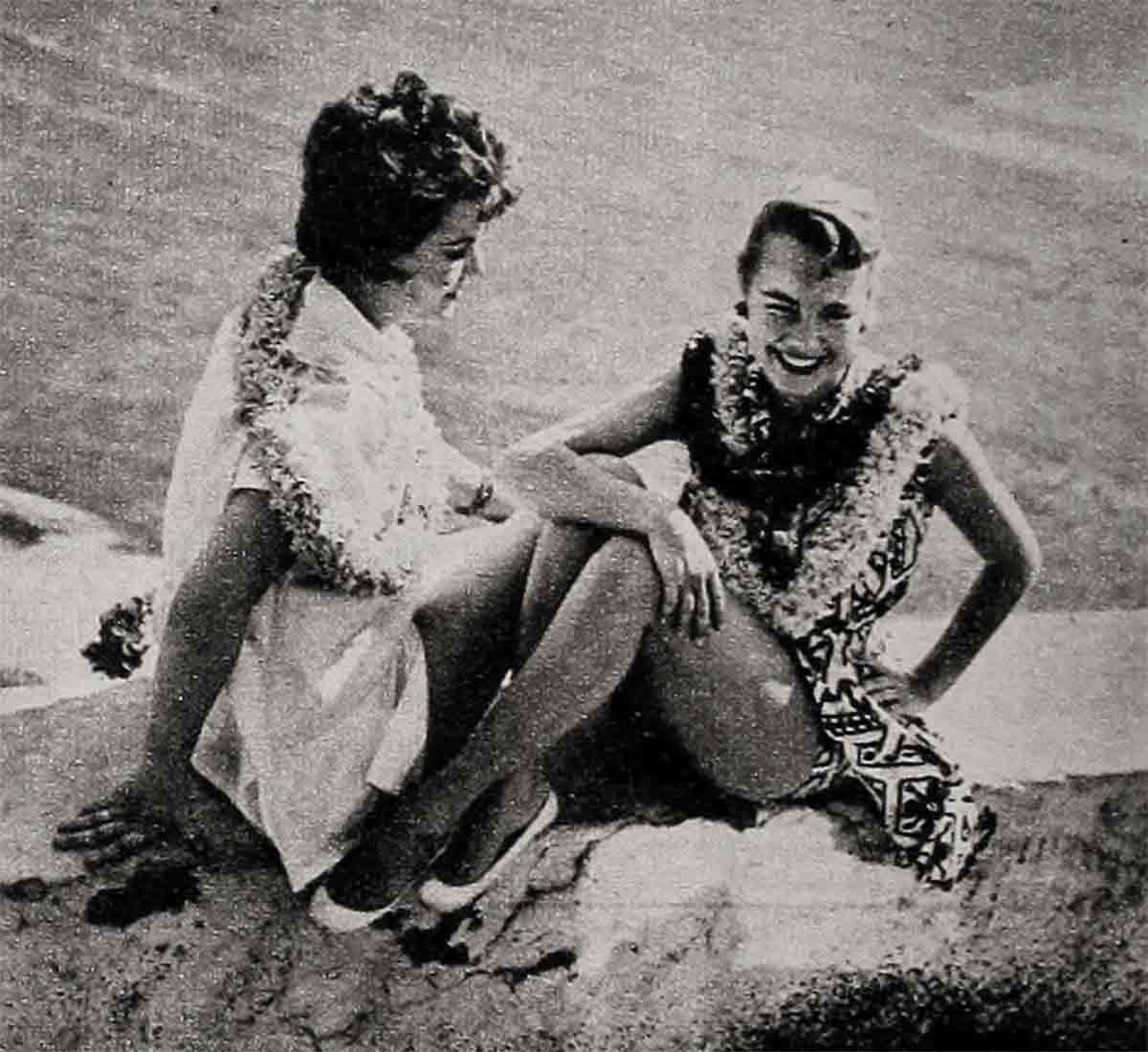
And for five performances, Miss Moore wore the ermine bathing suit, to the piercing delight of the soldiers. “Some of them,” Terry has said since, “go for months without seeing an American girl. Imagine how long they go without seeing an ermine bathing suit!”
Their pleasure was not wholly shared by the guiding hands of what their entertainment should consist of. On Christmas night, Grant dragged his weary, hungry frame into an enlisted men’s mess, where he was told that Tokyo was frantic to get him on the phone, had called five times. Experiencing a premonition and an abrupt loss of appetite, he called the operator.
It was a wire from Hollywood. Miss Moore later was to tell the Los Angeles Examiner in an exclusive interview that the first notice of her recall came from the Army in Washington. That is not Grant’s recollection. He can quote the wire, addressed to him, word for word, today. As a document, it perhaps should be offered in somewhat immaterial evidence:
“USO Camp Shows and George Murphy request the return of Helen Koford, known as Terry Moore, to the zone of the interior immediately for violation of an agreement with George Murphy. She is not to appear before any more U.N. troops.” It was signed by the Coordinating Committee.
Rather regretfully, Grant delivered the tidings to Terry and her mother.
After that, somebody kicked down the barn door.
At least one person, presumably close to the chain of events, has said it was Terry herself: “She and this sergeant in the Public Relations Office got together and called United Press. U.P. had five stories out before any other wire service got off its duff. Last I heard of the sergeant, he was loading ammunition within whistling distance of Manchuria.”
Terry says positively no. “U.P. called me. There was a sergeant who was sympathetic toward me, but if he’d done anything like that, he would have been court-martialed.”
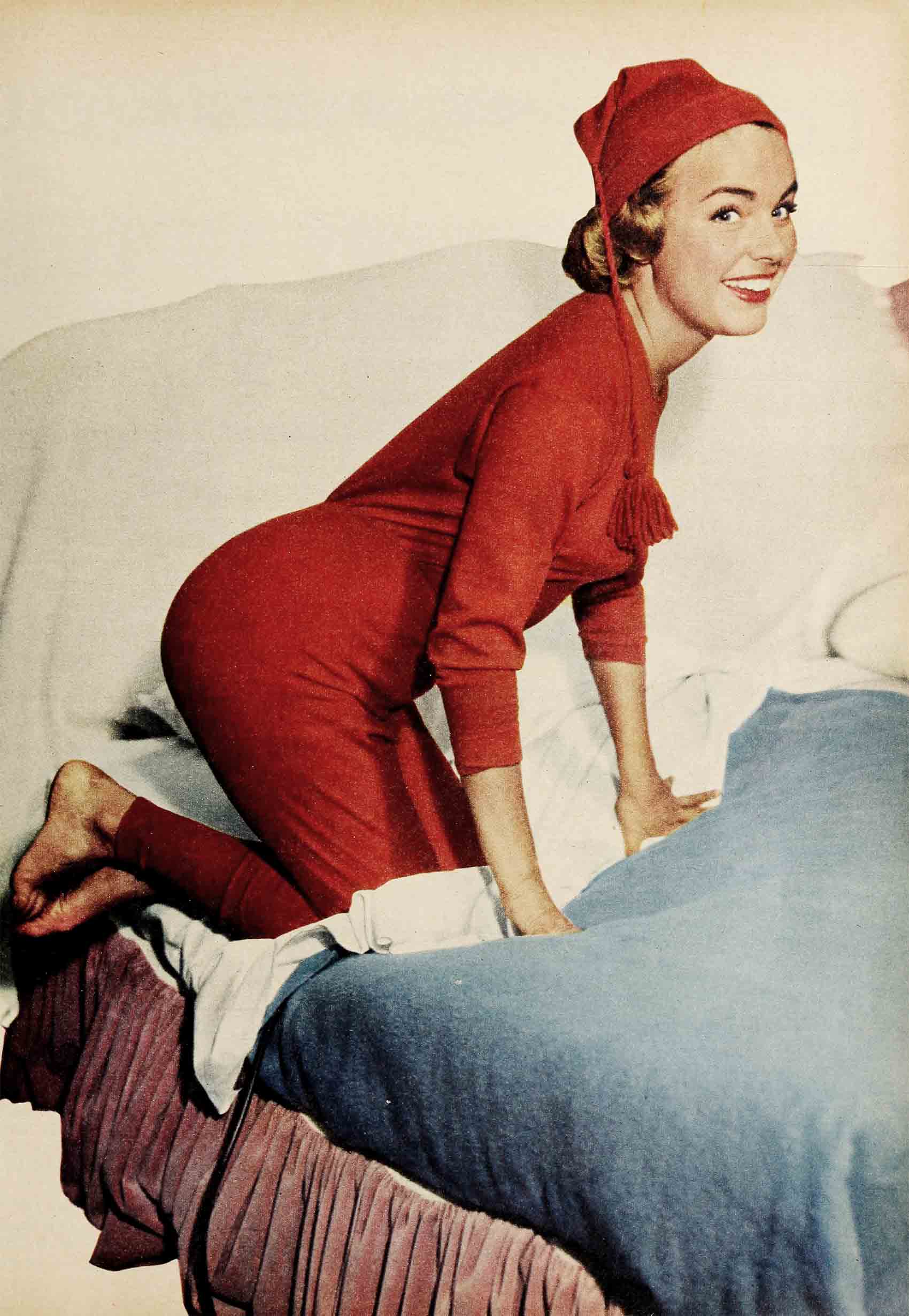
In addition, she says, that night was a tough one. “Mother and I cried and cried. How can they say it was for publicity! Why, that would have been the same as a dishonorable discharge! It could have ruined my career! It almost did! I guess it’s mostly blown over now, but for a little while it could have gone either way.”
Rescue came the next morning. An hour after the rest of the troupe had been flown out for a point further north, the ejection order was countermanded. Terry and her mother were put in two separate planes to follow them, and Terry arrived in time to walk on-stage just as Grant had introduced Penny Singleton, another member of the company.
“Surprised?” said Terry to Grant remembers it.
“Very,” said Grant. “Shall we dance?”
But at noon that day, Grant received another call, and had to give Terry the: bad news all over again. “I don’t know,” he told her, “where this one came from. But you’ll still have to go.”
But a second countermand came through, and that was the clincher. Terry had won out—but not the bathing suit. The bathing suit was through.
This final countermand reputedly was the doing of General Taylor himself, who was supposed to have called Grant and asked in bemused exasperation what in the world was going on up there. Grant told him, as well as he was able, and Taylor asked him: “Listen, is everything all right? The girl and the show and everything?” Grant assured him that everything was. “Okay, then,” said the general. “Stop worrying.”
It was too late. Johnny had shed fifteen pounds, already.
The papers Stateside—or “zone of the interior”—continued to yodel and click their heels. Korea had at last broken out something divorced from grief, stagnation and death.
Immediately on her return to Hollywood, Terry was inclined to blame the Army for her humiliation. A few days later, though, she had switched to the view that darker and less identifiable forces were to blame—not the Army nor the USO, but a kind of pressure lobby she labeled feelingly as “You know.” “Everybody,” she said, “was pressurized.”
That is not impossible. “Even before she left the country,” a man well acquainted with the shambles has deposed, “people were sending wires and letters to the War Department protesting against what she hadn’t even done yet. They were misled by the Bikini and striptease talk. I wish the joes who write these stories and captions would find out what a Bikini bathing suit is before they begin to use the term.”
“I wish they would, too,” Terry Moore said, again in summation. “I’d never wear one of those because I think the more you have on, the sexier it is.”
Terry Moore lives a nice family life on a nice family street in the part of West Los Angeles called Westwood Hills. It is not far from UCLA, where she is studying for a degree and may well have one in a year or a year and a half. Four days after her return, a friend and occasional historian of hers drove up to her house, blew the horn and invited her to come down and tell him all about it. The two have an informal working basis, wherein he drives her around the neighborhood while she thrashes her verbal way out of whatever buzzsaw she has encountered recently.
She is difficult not to believe. She is small, earnest and cute, and she does not hide behind double-talk. On the contrary, she may well talk herself into a kind of film purgatory one of these days. And if once in a while there comes into her voice a crisp, hard undertone when she speaks of publicity values, the tendency is just to imagine you heard it.
This day, there was no doubt that hey feeling was genuine.
“The terrible thing is,” she wailed in part, “that from now on anything I do will be tagged, ‘publicity,’ and they’ll be saying I’ll do anything for it.”
Do not write Miss Moore off as a prophet A powerful columnist wrote: “Somebody but somebody, should talk to Terry Moore. The ermine bathing suit episode has gone to her head and now she’ll do anything for publicity!”
The day after that, the columnist had mellowed, attributing to Terry a sense of humor. She had received, she wrote, a letter from Miss Moore bearing the post script: “I’m majoring in psychology, but I guess it didn’t take.”
“Publicity!” now chirped a distraught Miss M. for the second time. “That’s what really hurts—their saying that. Look, I gave up my Christmas to go over there! Couldn’t I have got more publicity right here at home, posing for magazine layouts and doing interviews?”
Fortunately for auld lang syne, the question was a rhetorical one. But the answer is no.
Not everyone did think Miss. Moore made the trip for publicity. Another faction, not conspicuously more charitable, thought she’d gone to see a Texan friend, a lieutenant now stationed over there. What was there to that?
“Nothing,” said Miss M. flatly. “I know him, sure, and we-had a couple of dates in Tokyo, but there’s nothing to the story. And I don’t want to mention his name because his family wouldn’t like it. Nobody would care, anyway.”
But the romance was over?
Said Miss M., “It never began.”
And what of the report that she’d had some difficulties getting home (via a stopover in Honolulu) but had them straightened out by a powerful business acquaintance in Los Angeles?
“Who, me?” said Terry.
And all that over a bathing suit!
“All that over a bathing suit!” she echoed. “And I almost didn’t wear it. It would have been Susan Zanuck, but it was a little too small for her. I had a dress I’d much rather have worn, one that Mother made for me, with Christmas decorations and spangles all over it. I guess my good deed for 1953 backfired, all right.” Susan Zanuck, daughter of 20th Century-Fox production chief Darryl, was part of the troupe, and a much liked and respected part. Grant nearly blew a fuse in his relief that this was so. He confessed to her that he had a phobia about bosses’s daughters, and had prepared for the worst. Then he barely stopped short of throwing his arms around her.
Other post storm rumbles were not so unequivocally cordial. Murphy was accused in some places of having blown his stack because the bathing suit bit could have put a crimp in Washington political ambitions he is reported to harbor. An opposite and larger faction contends he not only did not authorize the telegram of recall, but did not even know about it, and was embarrassed when he found out. This school of thought believes another USO officer primed the whole deal, using Murphy’s name.
While Terry stoutly maintains that the entire troupe stuck by her, one or two of the troupe were heard to snort that to salvage any personal mention out of the ermine bathing suit ruckus, they’d have had to wear sable-tipped antlers and swallow thousand-dollar bills.
Among other exhibits for the defense, Terry is able to offer a tape recording of an Army radio commentator’s rhapsodic review of her performance, a high-ranking chaplain’s approval both of the bathing suit and her act,and a mass of shoulder-patches, insignia and medals, and badges bestowed on her by a grateful encampment. Of this, there can be little doubt—they loved her in Korea. She murdered ’em in Seoul.
But that still left unexplained the go-for-broke question: Why, when in effect it was agreed between her and Murphy that she would not wear the bathing suit, had she gone ahead and worn it?
Terry blinked once, and said: “They ordered me to!”
Eh? Who?
“The Army!” said Terry. “The chaplain approved the bathing suit. And a general. And Johnny Grant said I should go ahead and wear it! Wouldn’t you call that an order?”
On the other hand, there is one other possible solution, perhaps not too farfetched. It is that Terry didn’t know whether she was wearing a bathing suit or a dress. At least once she has demonstrated alarming myopia toward large, flashy objects.
A few weeks ago she was out driving with a friend in a sort of beige-colored, unwashed Cadillac convertible with red leather upholstery and a back seat that suggested he had been using it to transport sheep. Bear the description in mind.
By and by they stopped at a newsstand where Terry expressed the wish to pick up a-couple of magazines. She picked up $2.75 worth and staggered beneath this load back toward the car. But she got into the car parked next to it—a robin’s-egg blue Ford station wagon, impeccable and glossy with pearl grey upholstery and a back seat as pristine as Tiffany’s window.
Hey, called her baffled escort. Wrong car.
“Oh, really?” said Terry, changing cars with no apparent awareness of the difference between them.
Of course her mind was on something else. She had to take a final exam at UCLA that night and she had been cramming most of the day.
What was the subject?
“Oh, it’s a play by Bill Saroyan. I’m supposed to read it and write a review.”
Which one?
“I forget the name. Something about ‘happy.’ Happy World—something like that.”
The Time Of Your Life?
“That’s it,” said Miss M. “You know. Happy.”
So it could have been this cram-session that had distracted her. But the cars were spectacularly dissimilar, almost like an ermine bathing suit and a long dress with spangles. It might have helped if the Army and the newspapers and the USO and all had known of this myopia. It might have saved everybody, notably Terry Moore, a lot of grief.
And it could have saved her a few surplus pounds. For Terry does not, like the luckless Mr. Grant, shrivel in adversity. She expands. Let the ominous frown of impending misfortune show itself, and Terry begins to pack away the victuals like an escapist going for the needle.
“It’s simply terrible,” she has said. “My stomach goes boinnggg, and I have to eat to pacify it. Just like ulcers, only I haven’t got ulcers. But when I’m worried, I eat like mad, and when there’s a crisis—oh, my! If things get bad enough, I won’t be able to get out a door without turning sideways.”
Things were no more than moderately bad at that moment. The tumult and the shouting were dying down, and Terry had obliterated just two modest chili hot dogs, two root beers, and a small stack of potato chips. Dinner was a good hour and a half away, long enough for any solid eater grappling with catastrophe to work up an appetite.
She and the MODERN SCREEN operative were sitting in the open inner patio of the Brentwood Market, a charming establishment where screen stars are a dime a dozen and potato chips not much more. It seemed a good place to be winding up The Case Of The Ermine Bathing Suit—too hot next to the fire and chilly and indifferent once you were away from it.
“I’m cold on my right,” said Miss M., “and toasted on my left. Let’s go.”
THE END
—BY JOHN MAYNARD
It is a quote. MODERN SCREEN MAGAZINE APRIL 1954





No Comments